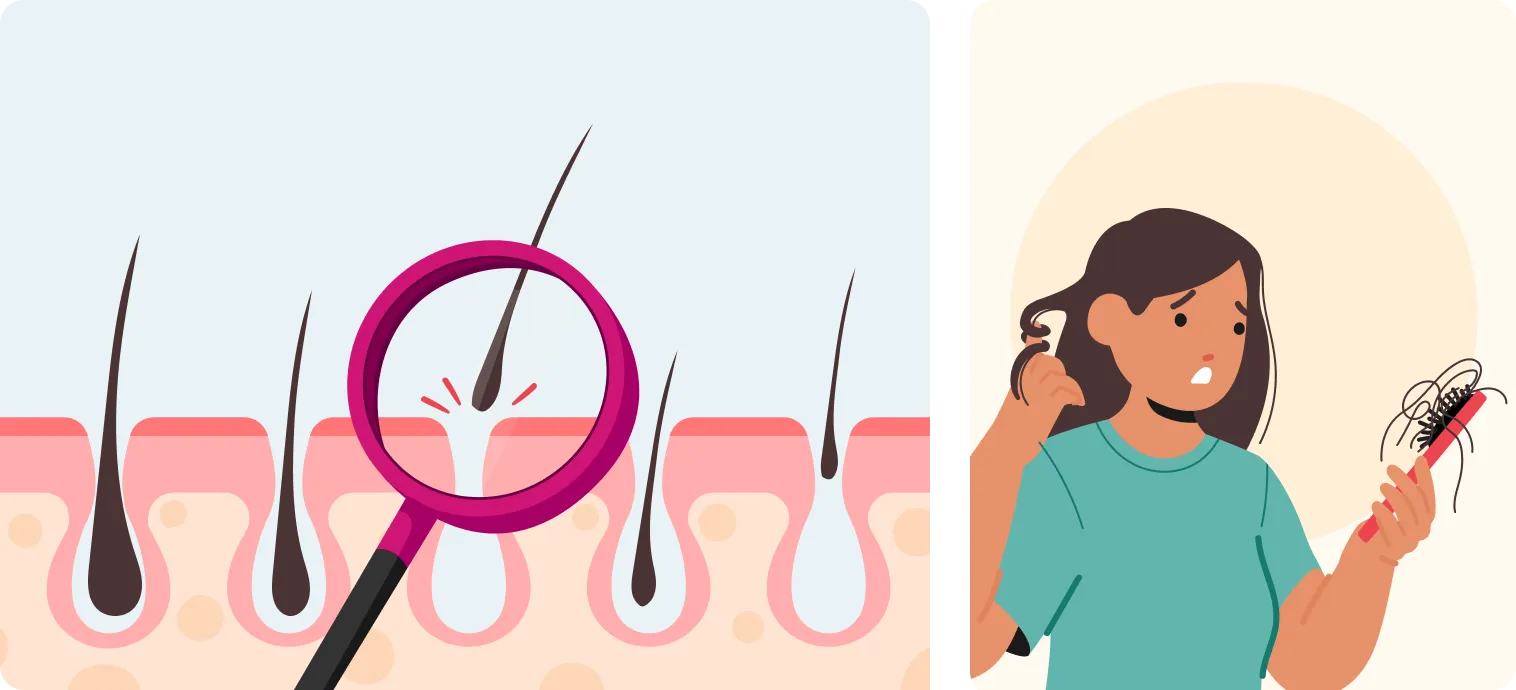Hair loss or hair shedding can be an unexpected and distressing side effect from GLP-1 injections, such as semaglutide (Wegovy) and tirzepatide (Mounjaro). Whilst not officially listed as a common side effect, our patients taking GLP-1 receptor agonist injections have often reported increased hair loss during treatment.
So, if you’ve noticed more hair on your brush or in the shower drain, you’re not alone. And you’re certainly not imagining it. Read through this information on hair loss from GLP-1 injections to better understand why it happens, when it typically occurs, and what you can do about it.

Why does hair loss happen on GLP-1s?
There’s no single cause for GLP-1-related hair loss. Rather, it’s likely a combination of biological and lifestyle changes that accompany rapid weight loss.
These medications work by reducing appetite and slowing digestion, which leads to significant weight loss in a relatively short period. When your body loses weight quickly, it can sometimes interpret this as a stress event, triggering telogen effluvium—a temporary condition where more hair follicles shift into the resting phase and fall out sooner than usual.
Additional contributing factors may include:
- Ongoing stress, which disrupts normal hair growth cycles
- Reduced protein or nutrient intake (particularly iron, zinc, and biotin)
- Hormonal shifts associated with fat loss
- Metabolic changes as your body adapts to rapid weight loss
When does hair loss from GLP-1 injections happen?
Hair loss typically begins 2 to 4 months after major weight loss starts and can continue for several months before improving. The encouraging news is that in most cases, it’s temporary and reversible.
How to support hair health while on GLP-1s
If you’re experiencing hair shedding during treatment, there are evidence-based steps you can take to support your body through this transition:
Nutritional Support:
- Prioritise protein intake – aim for 60–80g daily if you’re losing weight, focusing on complete proteins like lean meats, fish, eggs, and legumes
- Maintain consistent multivitamin supplementation, especially important when eating less
- Monitor key nutrients – request blood tests for iron, zinc, B12, and vitamin D levels through your GP
Lifestyle Modifications:
- Manage stress effectively through adequate sleep (7-9 hours), mindfulness practices, or gentle exercise
- Stay well-hydrated – aim for at least 2 litres of water daily
- Consider gentle hair care – use mild shampoos, avoid excessive heat styling, and be gentle when brushing
Professional Support:
- Consult a trichologist or dermatologist for specialised hair loss assessment
- Discuss topical treatments like minoxidil with a healthcare professional
- Consider scalp massage to improve circulation
Important: Never discontinue your GLP-1 medication without consulting your healthcare provider. Hair loss can feel alarming, but your overall health takes priority, and there are effective ways to care for your hair whilst continuing your medication.
FAQs
Is hair loss a known side effect of semaglutide or tirzepatide?
Hair loss is not listed as a common side effect on official prescribing information, but it has been reported by many people taking GLP-1 injections.
Will my hair grow back once I stop losing weight?
In most cases, yes. Hair loss caused by telogen effluvium is temporary. Once your body adjusts to your new weight and nutrient intake stabilises, hair growth often returns to normal within 3–6 months.
Can supplements help with GLP-1-related hair loss?
They can support recovery, especially if your hair loss is related to low levels of iron, zinc, or biotin. A general multivitamin and adequate protein intake are a good start—speak to your pharmacist for personalised advice.
Should I stop my GLP-1 injection if I’m losing too much hair?
Never stop your medication without speaking to your GP or pharmacist. There may be other ways to manage the side effect while continuing your treatment plan safely.
How can I tell if my hair loss is related to my GLP-1 medication or something else?
If hair loss began 2-4 months after starting your GLP-1 medication and coincides with significant weight loss, it’s likely related to your treatment. However, other causes of hair loss should be ruled out by a healthcare professional, particularly if the pattern seems unusual or severe.
Related
- Bloating from GLP-1 Injections
- Common GLP-1 Weight-loss Side Effects
- Constipation from GLP-1 Injections
- Dehydration from GLP-1 Injections
- Diarrhoea from GLP-1 Injections
- Dry Mouth from GLP-1 Injections
- Fatigue from GLP-1 Injections
- Flatulence from GLP-1 Injections
- Hair loss from GLP-1 Injections
- Obesity
- Weight Loss


























